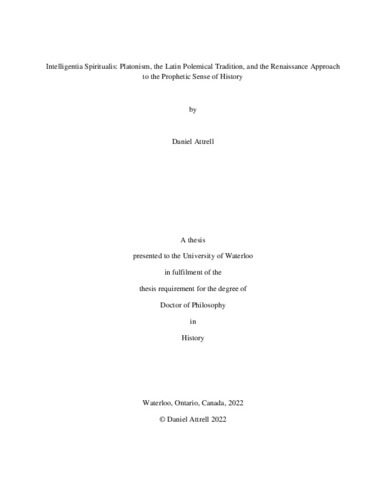| dc.contributor.author | Attrell, Daniel | |
| dc.date.accessioned | 2022-07-25 12:54:43 (GMT) | |
| dc.date.available | 2023-07-26 04:50:05 (GMT) | |
| dc.date.issued | 2022-07-25 | |
| dc.date.submitted | 2022-06-13 | |
| dc.identifier.uri | http://hdl.handle.net/10012/18460 | |
| dc.description.abstract | This study sheds light on key figures and trends in the medieval Latin West that influenced the intellectual lives of the humanist theologians Marsilio Ficino (1433–99) and Giovanni Pico della Mirandola (1463–94), specifically regarding their respective visions of world history, which they understood primarily through the lens of biblical prophecy and the Greco-Roman classics. It highlights continuities over changes from the medieval to the Renaissance period so as to demonstrate how a longstanding culture of interreligious theological and philosophical disputation between Christians, Jews, and Muslims, particularly among converts, served as a vehicle for the exchange (and appropriation) of knowledge across linguistic and cultural boundaries. Among the exchanged and appropriated ideas were not only insights into the history of the world – its beginning, middle, and end – but also deeply intertwined mystical concepts, some of Late Antique Pythagorean and Platonic provenance, and some derived from more recent innovation, such as those derived from medieval Jewish Kabbalah, especially regarding the correct understanding of divine names (what is herein called ‘esoteric philology’). During the Renaissance, humanist theologians reinterpreted, recombined, and redeployed these concepts in various ways to serve their own particular pro-Christian polemical ends. This study, therefore, focuses on the rise, development, and embattlement of a distinctly Latin anti-Jewish polemical tradition, and attempts to demonstrate how the pro-spiritual and anti-carnal attitudes present in Ficino and Pico’s theological works cannot be fully understood without locating them within the wider context of this longstanding culture of interreligious disputation. | en |
| dc.language.iso | en | en |
| dc.publisher | University of Waterloo | en |
| dc.subject | Giovanni Pico della Mirandola | en |
| dc.subject | Marsilio Ficino | en |
| dc.subject | Platonism | en |
| dc.subject | Neoplatonism | en |
| dc.subject | Jewish-Christian relations | en |
| dc.subject | Kabbalah | en |
| dc.subject | Western Esotericism | en |
| dc.subject | polemics | en |
| dc.subject | Renaissance | en |
| dc.subject | Latin literature | en |
| dc.subject | medieval philosophy | en |
| dc.subject | intellectual history | en |
| dc.subject | prophecy | en |
| dc.subject | interreligious debate | en |
| dc.subject | Pythagoreanism | en |
| dc.subject | Tetragrammaton | en |
| dc.subject | divine names | en |
| dc.subject | esoteric philology | en |
| dc.subject | Heptaplus | en |
| dc.subject | De Christiana religione | en |
| dc.subject | 900 Conclusions | en |
| dc.subject | Apologia | en |
| dc.subject | disputation | en |
| dc.subject | prophetic sense of history | en |
| dc.subject | Italy | en |
| dc.subject | Spain | en |
| dc.subject | France | en |
| dc.subject | humanist theology | en |
| dc.subject | Kabbalistic conclusions | en |
| dc.title | Intelligentia Spiritualis: Platonism, the Latin Polemical Tradition, and the Renaissance Approach to the Prophetic Sense of History | en |
| dc.type | Doctoral Thesis | en |
| dc.pending | false | |
| uws-etd.degree.department | History | en |
| uws-etd.degree.discipline | History | en |
| uws-etd.degree.grantor | University of Waterloo | en |
| uws-etd.degree | Doctor of Philosophy | en |
| uws-etd.embargo.terms | 1 year | en |
| uws.contributor.advisor | Bednarski, Steven | |
| uws.contributor.advisor | Porreca, David | |
| uws.contributor.affiliation1 | Faculty of Arts | en |
| uws.published.city | Waterloo | en |
| uws.published.country | Canada | en |
| uws.published.province | Ontario | en |
| uws.typeOfResource | Text | en |
| uws.peerReviewStatus | Unreviewed | en |
| uws.scholarLevel | Graduate | en |

